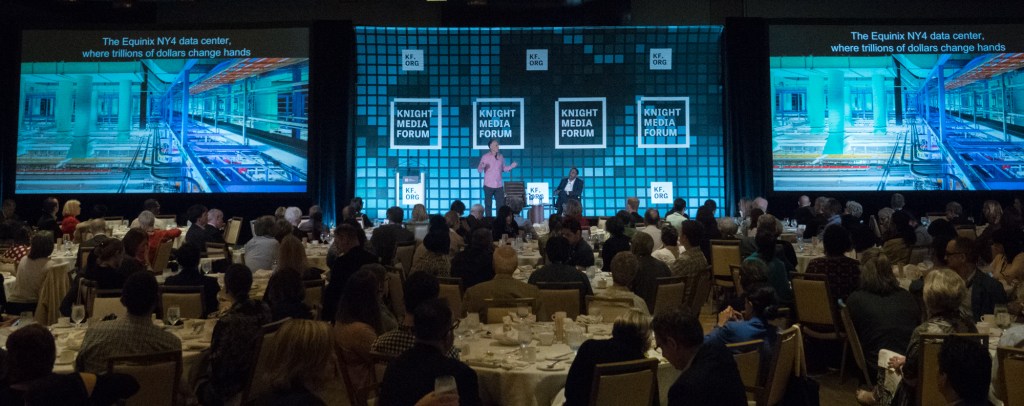
Code2040: Eradicating the tech industry’s diversity blind spot

This piece is one of a series that looks at the Knight News Challenge winners, and their thoughts on future trends, on the occasion of the challenge’s 10th anniversary.
Laura Weidman Powers believes the challenge facing people of color and the U.S. economy today is this: “As tech powers the economy and shapes our world, and as people of color become the majority, being shut out of tech means being shut out of the economy.” The consequences of such exclusion for communities of color and for the future competitiveness of the U.S. economy are significant, she said. It’s why she and Tristan Walker co-founded Code2040 in 2012, to build a bridge between the talent companies said they couldn’t find among minority racial and ethnic groups and the incredible job opportunities in Silicon Valley.
“We started with five students in our Fellows Program that matches computer science students with internships at tech companies,” she recalled, but quickly learned that “the focus on the individual pipeline ignored systemic issues – norms, expectations, and processes – that were keeping many people out, and the consequences of exclusion are significant.” Since winning a $400,000 Knight News Challenge Grant in 2014, Powers says the nonprofit organization has “transitioned from an education organization where diversity in tech is the end, to systems-focused organization where diversity in tech is a means to an end.”
One vehicle for achieving that end is Code2040’s Fellows Program, which supports students of color through a summer-long career accelerator and professional mentoring. Tech Trek, another student-facing program brings together Black and Latinx college students for a week of peer-bonding and exploration of tech companies and career paths. The benefit of these programs extends to both students and companies. “Companies are partners changing their cultures and removing barriers to Black and Latinx success,” said Powers, with Code2040 helping companies, “examine biases that prohibit diverse hiring. One company even overhauled their hiring process for entry-level hires and shared their work with the broader community.”
Powers said winning the News Challenge helped Code2040 grow and make the shifts required to be responsive to the broader challenges that were emerging in the sector and the country. “Thanks to this support, we’re building a community of 40,000 change-makers by 2020 who will work to diversify tech and create economic opportunity,” she predicted.
Knight Foundation followed up with a $1.2 million grant in 2016 to expand its student and entrepreneurship development programs. Code2040 is deploying the new funding in part to expand the Fellows Program to New York City, working with companies such as Goldman Sachs Group, The New York Times and Spotify. They have also launched a Company Culture Transformation Department which offers diversity assessment, training, and coaching for companies, and a Community Mobilization Department which develops in-person and online experiences, resources, and opportunities to grow and engage their community of Black and Latinx technologists and allies.
Bringing diversity to the U.S. information technology and communications industries amid the explosion of new social media platforms over the past decade must be judged against the backdrop of several major currents in American society today, Powers said. One is the increasing role of technology in the U.S. economy. Another is the increasing diversity of the United States. And another is rising income and wealth inequality. “The year 2040 is the beginning of the decade when the United States will become majority people of color,” she said. “Yet the economic indicators of many of these communities, specifically black and Latinx people, are alarming.” Indeed, the most recent wealth data from the Federal Reserve’s Survey of Consumer Finances found that in 2016, the median black household had $17,600 in net worth and a similar Latino family had $20,700 in net worth compared to $171,000 for a comparable white household.
To bridge this yawning wealth gap, Code2040 labors to ensure workers of color enter technology professions where good jobs with good incomes offer opportunities for advancement. Two most recent and comparable-in-time income data points underscore the importance of these initiatives. In 2015, the median pay of a software engineer was $98,260, according to the U.S. Labor Department, while at the end of 2014 the combined median household income
of a black family and Latino family was $86,300, according to the U.S. Commerce Department’s Current Population Survey. Communities of color, Powell says, “have to have access to these opportunities for wealth building and influence. What is developing on the Internet and in the tech industry overall is an opportunity to rewrite the rules of the economy. By diversifying tech we are expanding wealth building opportunities for black and Latinx people and creating a more equitable, inclusive and prosperous economy.”
What new areas of technology does Powers see as the greatest areas of opportunity for people of color over the next five to 10 years? We’ve been paying a lot of attention to AI,” she said. She believes that artificial intelligence is positioned today as a way to streamline efforts and remove bias from society, yet it actually simply reveals ongoing and systemic racism.
“The solution is to ensure that products are developed by all members of our community,” she argues. “Our hope is that in five years or 10 years we are no longer viewing diversity as an add-on and are no longer looking for an out-of-the-box solution to what is a complex yet urgent problem that affects the lives and well-being of all of us.”
Ed Paisley is the senior director at the Washington Center for Equitable Growth and a former journalist.
-
Journalism / Article
-
Journalism / Article
-
Journalism / Article
-
Technology / Article
-
Journalism / Article
-
Journalism / Article
Recent Content
-
Artsarticle ·
-
Artsarticle ·
-
Community Impactarticle ·








